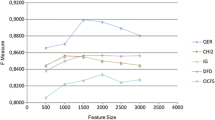Abstract
In contrast to classic retrieval, where users search factual information, opinion retrieval deals with the search of subjective information. A major challenge in opinion retrieval is the informal style of writing and the use of domain-specific jargon to describe the opinion targets. In this paper, we present an automatic method to learn a space model for opinion retrieval. Our approach is a generative model that learns sentiment word distributions by embedding multi-level relevance judgments in the estimation of the model parameters. The model is learned using online Variational Inference, a recently published method that can learn from streaming data and can scale to very large datasets. Opinion retrieval and classification experiments on two large datasets with 703,000 movie reviews and 189,000 hotel reviews showed that the proposed method outperforms the baselines while using a significantly lower dimensional lexicon than other methods.
Access this chapter
Tax calculation will be finalised at checkout
Purchases are for personal use only
Preview
Unable to display preview. Download preview PDF.
Similar content being viewed by others
References
Aktolga, E., Allan, J.: Sentiment diversification with different biases. In: Proceedings of the 36th International ACM SIGIR, p. 593 (2013)
Andrzejewski, D., Zhu, X.: Latent Dirichlet Allocation with topic-in-set knowledge. In: Proceedings of the NAACL HLT 2009 Workshop on Semi-Supervised Learning for Natural Language Processing, pp. 43–48 (2009)
Baccianella, S., et al.: SentiWordNet 3.0: An enhanced lexical resource for sentiment analysis and opinion mining. In: Proc.7th International LREC (2010)
Blei, D.M., et al.: Latent dirichlet allocation. J. Mach. Learn. Res. 3, 993–1022 (2003)
Blei, D.M., McAuliffe, J.D.: Supervised Topic Models. In: Advances in Neural Information Processing Systems (NIPS) (2007)
Chemudugunta, C., et al.: Modeling Documents by Combining Semantic Concepts with Unsupervised Statistical Learning. In: Proceedings of the 7th International Conference on The Semantic Web, pp. 229–244 (2008)
Chen, L., et al.: Extracting Diverse Sentiment Expressions with Target-Dependent Polarity from Twitter. In: Proc. of the 6th AAAI/ICWSM (2012)
Esuli, A., Sebastiani, F.: Sentiwordnet: A publicly available lexical resource for opinion mining. In: Proc. of the 5th International LREC, pp. 417–422 (2006)
Gerani, S., et al.: Proximity-based opinion retrieval. In: Proceeding of the 33rd international ACM SIGIR, p. 403 (2010)
Hoffman, M., et al.: Online learning for latent dirichlet allocation.In: Advances in Neural Information Processing Systems (NIPS) (2010)
Hu, M., Liu, B.: Mining and summarizing customer reviews. In: Proceedings of the tenth ACM SIGKDD, pp. 168–177 (2004)
Jakob, N., et al.: Beyond the stars: exploiting free-text user reviews to improve the accuracy of movie recommendations. In: Proceeding of the 1st CIKM Workshop on Topic-sentiment Analysis for Mass Opinion (TSA), pp. 57–64 (2009)
Jo, Y., Oh, A.H.: Aspect and sentiment unification model for online review analysis. In: Proc. of the 4h ACM Web Search and Data Mining, pp. 815–824 (2011)
Martineau, J., Finin, T.: Delta TFIDF: An Improved Feature Space for Sentiment Analysis. In: Proc. of the AAAI on Weblogs and Social Media (2009)
Mei, Q., et al.: Topic sentiment mixture: modeling facets and opinions in weblogs. In: Proceedings of the 16th International Conference WWW, pp. 171–180 (2007)
Moghaddam, S., Ester, M.: ILDA: Interdependent LDA model for learning latent aspects and their ratings from online product reviews. In: Proceedings of the 34th International ACM SIGIR, pp. 665–674 (2011)
Pang, B., Lee, L.: Opinion mining and sentiment analysis. Foundations and Trends in Information Retrieval 2(1-2), 1–135 (2008)
Ramage, D., et al.: Labeled LDA: A Supervised Topic Model for Credit Attribution in Multi-labeled Corpora. In: EMNLP, pp. 248–256 (2009)
Song, Y., et al.: Topic and keyword re-ranking for LDA-based topic modeling. In: Proceedings of the 18th ACM CIKM, pp. 1757–1760 (2009)
Sparling, E.I.: Rating: How Difficult is It? In: RecSys 2011 Proceedings of the fifth ACM Conference on Recommender Systems, pp. 149–156 (2011)
Titov, I., McDonald, R.: Modeling online reviews with multi-grain topic models. In: Proc. of the 17th International Conference on WWW, pp. 111–120 (2008)
Turney, P.: Thumbs up or thumbs down? Semantic orientation applied to unsupervised classification of reviews. In: Proc. of the 40th ACL, pp. 417–424 (2002)
Turney, P.D.: Mining the Web for Synonyms: PMI-IR versus LSA on TOEFL. In: Proc. of the 12th European Conference Machine Learning, pp. 491–502 (2001)
Velikovich, L., et al.: The Viability of Web-derived Polarity Lexicons. In: Human Language Technologies: Proceedings of the NAACL, pp. 777–785 (2010)
Wang, H., et al.: Latent aspect rating analysis on review text data. In: Proc. of the 16th ACM SIGKDD, p. 783 (2010)
Weichselbraun, A., et al.: Extracting and Grounding Contextualized Sentiment Lexicons. IEEE Intelligent Systems 28(2), 39–46 (2013)
Wilson, T., et al.: Recognizing contextual polarity in phrase-level sentiment analysis. In: Proceedings of the Conference on HLT/EMNLP, pp. 347–354 (2005)
Zhang, M., Ye, X.: A generation model to unify topic relevance and lexicon-based sentiment for opinion retrieval. In: Proceedings of the 31st Annual International ACM SIGIR, pp. 411–418 (2008)
Author information
Authors and Affiliations
Corresponding author
Editor information
Editors and Affiliations
Rights and permissions
Copyright information
© 2015 Springer International Publishing Switzerland
About this paper
Cite this paper
Peleja, F., Magalhães, J. (2015). Learning Ranked Sentiment Lexicons. In: Gelbukh, A. (eds) Computational Linguistics and Intelligent Text Processing. CICLing 2015. Lecture Notes in Computer Science(), vol 9042. Springer, Cham. https://doi.org/10.1007/978-3-319-18117-2_3
Download citation
DOI: https://doi.org/10.1007/978-3-319-18117-2_3
Publisher Name: Springer, Cham
Print ISBN: 978-3-319-18116-5
Online ISBN: 978-3-319-18117-2
eBook Packages: Computer ScienceComputer Science (R0)




